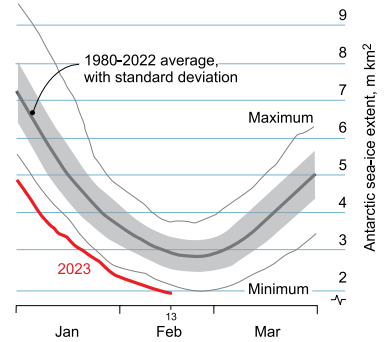At the beginning of March 1898, a Belgian research
ship became stuck in the ice of Antarctica’s Bellingshausen
sea. The Belgica ship and its crew — which included Roald
Amundsen, who later became the first man to reach the
South Pole — remained there for a year. Scientists aboard
Polarstern, a German research ship currently in the same
place, have a very different view: in the beginning of February
2023, the expedition leader said he had never seen the sea so
destituted of ice. In 2023, on February 13th, sea ice across the
Antarctic as a whole reached 1.91 million square kilometres
(m km2
), the lowest level since satellite records began in 1979.
The world is now, on average, 1.0-1.3 ºC hotter than it
was before the Industrial Revolution. However, that change
has not occurred evenly: the poles are warming faster than
regions in the middle of the globe.
Sea-ice extent around Antarctica was relatively stable
until 2014. It has been declining sharply since then. One study
by a climatologist at America’s National Aeronautics and
Space Administration (NASA) considers that between 2014
and 2017 Antarctic sea ice receded three times as quickly as
during any comparable period in the Arctic. Antarctic sea ice
shrinks to a minimum during late February and early March,
during the southern hemisphere’s summer. It hit record lows
in 2022 and again now in 2023.
These changes have prompted much research into how
global warming is affecting Antarctica. The biggest concern is
over the enormous West Antarctic ice sheet, which is smaller
but less stable than its eastern counterpart. Scientists say that
it risks collapse if it melts beyond a certain point, which could
result in a global sea-level rise of up to three metres. It is
unlikely to happen any time soon, but increasing evidence of
instability in Antarctica’s ice sheets is cause for concern.
(www.economist.com, 20.02.2023. Adaptado.)







